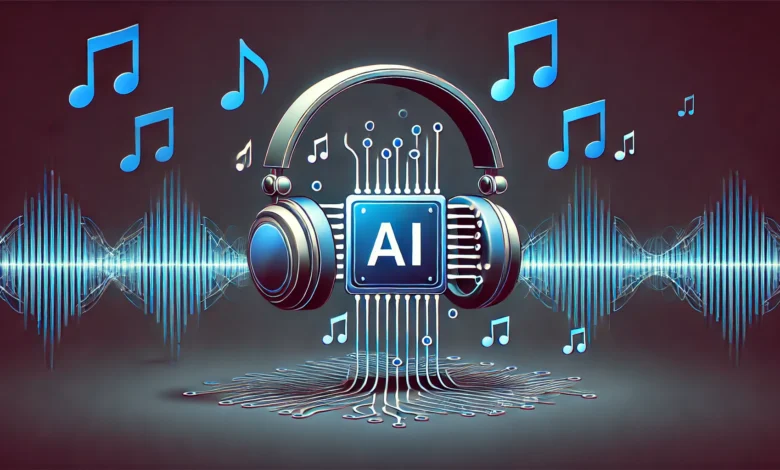AI Music Generator from Text: Transforming the Future of Music Creation

The rapid advancement of artificial intelligence (AI) has begun to reshape the landscape of many industries, and the world of music is no exception. One of the most groundbreaking innovations is the development of AI music generators from text, tools that enable users to create music by simply typing a description. This fusion of language processing and music composition is not only democratizing music creation but is also making it faster, more accessible, and more customizable than ever before.
What Is an AI Music Generator from Text?
An AI music generator from text is a sophisticated tool that utilizes artificial intelligence and natural language processing (NLP) to convert written descriptions into full musical compositions. Users provide a text prompt specifying the genre, mood, instruments, tempo, and other desired characteristics of the music. The AI then interprets these instructions and generates a unique piece of music that aligns with the user’s vision. This entire process happens in a matter of minutes—or even seconds—revolutionizing how music is created.
For example, a user might type, “Generate an upbeat pop track with a catchy melody and electric guitar,” and within moments, the AI will produce a custom piece that matches the description. The tool could then provide the user with a downloadable audio file ready to use for videos, advertisements, games, or personal projects.
How Does an AI Music Generator from Text Work?
At the heart of these AI tools is a combination of advanced machine learning algorithms, natural language processing, and large datasets of music across various genres and styles. Here’s a breakdown of the process:
- Text Input: The process begins when the user inputs a descriptive text. This could range from simple instructions like “Create a calm piano piece” to more detailed prompts such as “Generate an electronic dance track with heavy bass and syncopated drums.”
- Natural Language Processing (NLP): The AI then uses NLP algorithms to parse and understand the text. NLP helps the AI recognize specific instructions such as mood (e.g., joyful, sad, dramatic), genre (e.g., jazz, rock, classical), and tempo (e.g., fast, slow). This step is crucial because it ensures the AI generates music that aligns with the user’s expectations.
- Composition Generation: After interpreting the text, the AI moves on to the composition phase. It draws from an extensive database of musical patterns, styles, and structures that it has learned through deep learning. Using this information, the AI composes a piece of music that adheres to the guidelines set by the user.
- Instant Output: The result is a fully composed track that can be downloaded or streamed in real-time. The output is often provided in popular formats like MP3 or WAV, ensuring compatibility with a wide range of applications and use cases.
Key Benefits of Using an AI Music Generator from Text
The rise of AI music generators offers several significant advantages to both amateur and professional musicians, content creators, marketers, and more. Here are the key benefits of using these tools:
1. Speed and Efficiency
Traditional music composition can be a time-consuming process, often requiring weeks or even months to finalize. AI music generators, however, can produce high-quality tracks in mere minutes, allowing creators to save time and focus on other aspects of their projects.
2. Accessibility
Not everyone has formal training in music composition, yet many people need music for projects. AI music generator from text with a professional look eliminate the need for advanced musical knowledge, making music creation accessible to individuals with no prior experience in music theory or production. Whether you are a filmmaker, content creator, marketer, or game developer, these tools provide an easy way to generate professional-grade music.
3. Cost-Effectiveness
Hiring a professional composer or purchasing stock music licenses can be expensive. AI music generators provide a low-cost alternative, enabling creators to access high-quality, customized music without the need for large budgets. This is particularly valuable for independent creators, small businesses, or startups with limited resources.
4. Customization and Control
AI music generators offer a high degree of customization. Users can specify exactly what they want in terms of genre, mood, tempo, and instrumentation. Whether you need a cinematic orchestral score or a lively jazz tune, these tools can generate a track that fits your precise needs. Moreover, some platforms allow for real-time adjustments, providing even more creative control.
5. Creative Flexibility
AI music tools open up new creative possibilities. They can generate compositions that users may not have considered, offering a fresh perspective on musical ideas. Whether you’re looking to experiment with an unfamiliar genre or create something entirely unique, AI music generators provide endless opportunities for exploration.
Applications of AI Music Generators from Text
The versatility of AI music generators from text makes them suitable for a wide range of industries and applications. Here are some notable use cases:
1. Content Creation
Content creators across platforms like YouTube, Instagram, and TikTok need music to accompany their videos. AI music generators provide an efficient way to generate original tracks that perfectly fit their content. Whether it’s background music, intro/outro themes, or soundtracks for videos, AI music tools offer a quick solution.
2. Advertising and Marketing
Marketers often need custom jingles, soundtracks, or background music to accompany advertisements, commercials, and campaigns. AI music generators allow brands to create music on demand, tailored to their messaging, target audience, and overall campaign theme.
3. Video Game Development
Video game developers need adaptive and immersive soundtracks that react to various in-game scenarios. AI music generators can create dynamic music that adjusts to the gameplay, ensuring that the music complements the game’s tone and enhances the player’s experience.
4. Film and TV Production
Filmmakers rely on original soundtracks to set the tone for their movies or television shows. AI music generators can quickly provide cinematic compositions that align with the emotional beats and atmosphere of scenes, allowing filmmakers to focus on storytelling rather than music composition.
5. Personal Projects
For individuals working on personal projects, such as home videos, presentations, or personal music compositions, AI music generators offer an accessible and efficient way to create original music without the need for expensive software or professional equipment.
Leading AI Music Generators from Text Tools
Several companies and platforms have emerged that offer AI-driven music generation from text tools. These include:
1. Amper Music
Amper Music allows users to generate original music by specifying genre, mood, and instruments. It is particularly popular among content creators and filmmakers for its ease of use and high-quality output.
2. Aiva (Artificial Intelligence Virtual Artist)
Aiva specializes in generating classical and orchestral music. It’s a perfect tool for filmmakers and game developers looking for cinematic soundtracks. Aiva offers a high degree of customization, allowing users to refine their compositions.
3. Soundraw
Soundraw is an AI-powered music creation platform that enables users to generate music based on specific genres, moods, and instruments. It is known for its user-friendly interface and the ability to modify compositions during the generation process.
4. Jukedeck (Now Part of TikTok)
Jukedeck was one of the pioneers in AI-generated music, and its technology now powers music creation features within TikTok. It allows users to create custom tracks in various styles for social media content.
5. OpenAI’s MuseNet
MuseNet by OpenAI is a deep learning model capable of generating complex music compositions across a wide range of genres. It can create multi-instrumental pieces, from classical to pop, and is used by both professionals and hobbyists to generate music based on textual prompts
The Future of AI Music Generators from Text
As AI technology continues to evolve, the capabilities of AI music generators are only going to expand. Here’s what we can expect in the coming years:
- Faster Processing: With improvements in computational power, AI music generators will continue to produce high-quality tracks even faster, allowing for real-time music generation.
- Enhanced Customization: Future AI tools will likely offer even greater customization, enabling users to fine-tune every element of the music, from melody and harmony to rhythm and instrumentation.
- Improved Emotional Understanding: AI will increasingly understand and replicate the emotional nuances in music, producing tracks that evoke specific feelings in listeners more effectively.
- Integration with Other Creative Platforms: AI music generators will likely integrate seamlessly with video editing software, game development engines, and other creative tools, creating a unified workflow for creators.
Conclusion
AI music generators from text are revolutionizing the way we create music. By leveraging the power of artificial intelligence, these tools offer a fast, accessible, and cost-effective way for anyone—from content creators to professionals—to generate high-quality, original music tailored to their needs. As the technology advances, the potential for AI in music creation will only continue to expand, providing unprecedented opportunities for creativity and innovation in music production. Whether you’re an artist, a filmmaker, or a marketer, AI music generators are here to transform your projects, making music creation easier, faster, and more dynamic than ever before.





